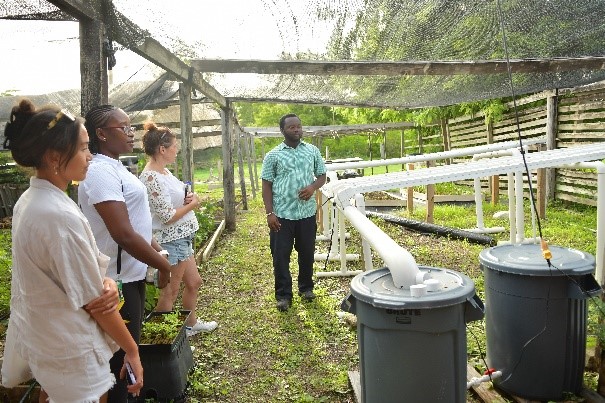Given the island’s history of drought, the graduates of the Sandals Foundation-sponsored hydroponics programme at the Gilberts Agricultural Rural Development (GARD) Centre are prepared to embark on climate-smart farming to help strengthen the nation’s food security.
By trading soil for nutrient-rich water, these graduates will be able to produce crops at any time of the year and achieve higher yields with fewer resources.
“With the NFT (nutrient film technique) hydroponics unit, 80 to 90 percent less water can be used to produce a lot more crops in a lot less space,” said Julia Roberts, a graduate.
“This is amazing, especially for us in Antigua where we are affected by drought,” she added.
Over a three-month period, more than a dozen students covered content in backyard gardening, nutrient solutions, plant problems, plant growth and culture in a hands-on learning course.
The graduates’ new knowledge, paired with the impressive potential of the hydroponics unit to mass produce crops, has now empowered them to join the ranks of food local producers.
“I experimented with growing lettuce, cabbage, chive, and cucumbers; herbs and vegetables useful in everyday cooking. It was incredible to see how quickly they grew and with far less effort than if I had ploughed the ground and planted seedlings,” another graduate said.
He continued, “I can’t wait to start growing more and selling to local markets and shops based on demand and supply, as well as challenging myself to grow tomatoes and peppers, which are additional food items that we consume on a daily basis.”
June Jackson, Executive Director of the GARD Center, explained the programme’s outcomes.
“Throughout the training, the young men and women were also taught how to construct a hydroponic unit and explored how hydroponic vegetable production can be turned into a business.”
Jackson added that these lessons, along with field trips to functional backyard gardens, have equipped the graduates with a holistic training that positions them to pursue innovative climate-smart farming practices that will increase the country’s food security.
Farming and agriculture support forms one of six key areas of intervention being implemented by the Sandals Foundation as it implements 40 sustainable community projects that have the power to transform Caribbean communities and improve lives.
Other projects to support food security in the region include strengthening the capacity of farmers in Hermitage, Jamaica to grow more and maximise their earning potential and the construction of a hen house and greenhouse at LN Coakley High School in The Bahamas.
The Foundation is also empowering the Grenada Network of Rural Women Producers (GRENROP) through farm business training.
Community compost training initiatives are being undertaken in the Turks and Caicos Islands to improve soil fertility, enhance school and backyard gardening which will in turn reduce the reliance on imported goods.


